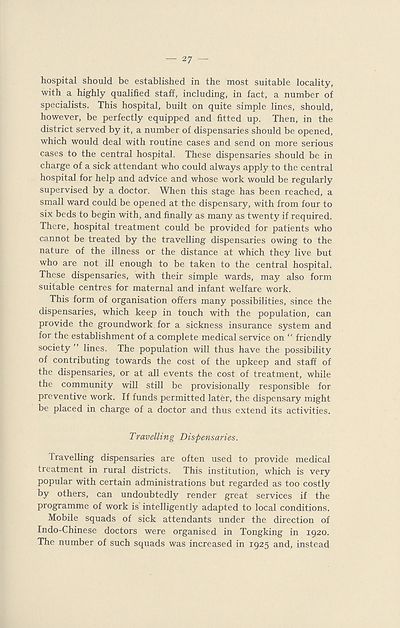Health > Intergovernmental conference of Far-Eastern countries on rural hygiene : report by the Preparatory Committee
(29)
Download files
Complete book:
Individual page:
Thumbnail gallery: Grid view | List view

— 27
hospital should be established in the most suitable locality,
with a highly qualified staff, including, in fact, a number of
specialists. This hospital, built on quite simple lines, should,
however, be perfectly equipped and fitted up. Then, in the
district served by it, a number of dispensaries should be opened,
which would deal with routine cases and send on more serious
cases to the central hospital. These dispensaries should be in
charge of a sick attendant who could always apply to the central
hospital for help and advice and whose work would be regularly
supervised by a doctor. When this stage has been reached, a
small ward could be opened at the dispensary, with from four to
six beds to begin with, and finally as many as twenty if required.
There, hospital treatment could be provided for patients who
cannot be treated by the travelling dispensaries owing to the
nature of the illness or the distance at which they live but
who are not ill enough to be taken to the central hospital.
These dispensaries, with their simple wards, may also form
suitable centres for maternal and infant welfare work.
This form of organisation offers many possibilities, since the
dispensaries, which keep in touch with the population, can
provide the groundwork for a sickness insurance system and
for the establishment of a complete medical service on “ friendly
society ” lines. The population will thus have the possibility
of contributing towards the cost of the upkeep and staff of
the dispensaries, or at all events the cost of treatment, while
the community will still be provisionally responsible for
preventive work. If funds permitted later, the dispensary might
be placed in charge of a doctor and thus extend its activities.
Travelling Dispensaries.
1 ravelling dispensaries are often used to provide medical
treatment in rural districts. This institution, which is very
popular with certain administrations but regarded as too costly
by others, can undoubtedly render great services if the
programme of work is intelligently adapted to local conditions.
Mobile squads of sick attendants under the direction of
Indo-Chinese doctors were organised in Tongking in 1920.
The number of such squads was increased in 1925 and, instead
hospital should be established in the most suitable locality,
with a highly qualified staff, including, in fact, a number of
specialists. This hospital, built on quite simple lines, should,
however, be perfectly equipped and fitted up. Then, in the
district served by it, a number of dispensaries should be opened,
which would deal with routine cases and send on more serious
cases to the central hospital. These dispensaries should be in
charge of a sick attendant who could always apply to the central
hospital for help and advice and whose work would be regularly
supervised by a doctor. When this stage has been reached, a
small ward could be opened at the dispensary, with from four to
six beds to begin with, and finally as many as twenty if required.
There, hospital treatment could be provided for patients who
cannot be treated by the travelling dispensaries owing to the
nature of the illness or the distance at which they live but
who are not ill enough to be taken to the central hospital.
These dispensaries, with their simple wards, may also form
suitable centres for maternal and infant welfare work.
This form of organisation offers many possibilities, since the
dispensaries, which keep in touch with the population, can
provide the groundwork for a sickness insurance system and
for the establishment of a complete medical service on “ friendly
society ” lines. The population will thus have the possibility
of contributing towards the cost of the upkeep and staff of
the dispensaries, or at all events the cost of treatment, while
the community will still be provisionally responsible for
preventive work. If funds permitted later, the dispensary might
be placed in charge of a doctor and thus extend its activities.
Travelling Dispensaries.
1 ravelling dispensaries are often used to provide medical
treatment in rural districts. This institution, which is very
popular with certain administrations but regarded as too costly
by others, can undoubtedly render great services if the
programme of work is intelligently adapted to local conditions.
Mobile squads of sick attendants under the direction of
Indo-Chinese doctors were organised in Tongking in 1920.
The number of such squads was increased in 1925 and, instead
Set display mode to:
![]() Universal Viewer |
Universal Viewer | ![]() Mirador |
Large image | Transcription
Mirador |
Large image | Transcription
Images and transcriptions on this page, including medium image downloads, may be used under the Creative Commons Attribution 4.0 International Licence unless otherwise stated. ![]()
| League of Nations > Health > Intergovernmental conference of Far-Eastern countries on rural hygiene : report by the Preparatory Committee > (29) |
|---|
| Permanent URL | https://digital.nls.uk/191097786 |
|---|
| Shelfmark | LN.III |
|---|---|
| Description | Over 1,200 documents from the non-political organs of the League of Nations that dealt with health, disarmament, economic and financial matters for the duration of the League (1919-1945). Also online are statistical bulletins, essential facts, and an overview of the League by the first Secretary General, Sir Eric Drummond. These items are part of the Official Publications collection at the National Library of Scotland. |
|---|---|
| Additional NLS resources: |
|

